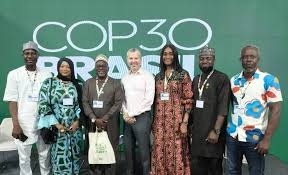The Nigerian Maritime Administration and Safety Agency has showcased a pioneering Public-Private Partnership model aimed at reducing carbon emissions in Africa’s maritime sector, unveiling the Nigerian Maritime Continuous Emissions Monitoring System at the 2025 UN Framework Convention on Climate Change in Balem, Brazil. The initiative underscores Nigeria’s commitment to advancing the International Maritime Organisation’s energy transition strategies through digital innovation and measurable action.
The agency presented the initiative at a side event it hosted during the conference, highlighting its efforts to transform ambition into tangible progress in line with IMO energy transition strategies. Speaking on behalf of the agency, the Director of Marine Environment Management explained that the system represents a coordinated effort to establish a verifiable Nigerian maritime emissions inventory, developed in collaboration with researchers from University College London. The system is expected to strengthen transparency, monitoring, and reporting across the maritime industry, positioning Nigeria as a leader in low-carbon shipping on the continent.
The NIMASA Director-General emphasised that the agency has consistently championed energy transition initiatives in Nigeria’s maritime sector, beginning with the launch of an African Coalition on IMO GHG emissions reduction strategies at COP 28, followed by presentations at COP 29 on developing the country’s maritime emissions inventory. At COP 30, the agency formally introduced the Continuous Emissions Monitoring System and engaged in discussions with expert panels from IMO, University College London, and maritime administrations across Ghana, Kenya, and Tanzania, alongside representatives from Nigerian federal and state agencies.
The session, attended by policymakers, maritime regulators, and industry stakeholders, provided strategic insights into how Africa can navigate the challenges of shipping energy transition while contributing to global greenhouse gas reduction goals. The IMO estimates that international shipping accounted for nearly 2.9 percent of global anthropogenic CO₂ emissions in 2018, prompting regulatory strategies such as mandatory energy efficiency measures under MARPOL Annex VI, the Energy Efficiency Design Index, and fuel consumption reporting requirements for larger vessels.
The NIMASA initiative not only demonstrates Nigeria’s readiness to adopt digital monitoring and low-carbon shipping technologies but also creates opportunities for private-sector innovation, research partnerships, and capacity development within the maritime ecosystem. By providing data-driven insights and a framework for emissions reduction, the agency aims to attract investment, support sustainable operations, and align the country’s maritime sector with global climate commitments.
With UNFCCC COP 30 expected to finalise indicators for measuring progress towards the Global Goal on Adaptation established under the Paris Agreement, NIMASA’s approach offers a model for how African maritime industries can implement practical, measurable, and scalable decarbonisation strategies while supporting economic growth and sustainable development.










